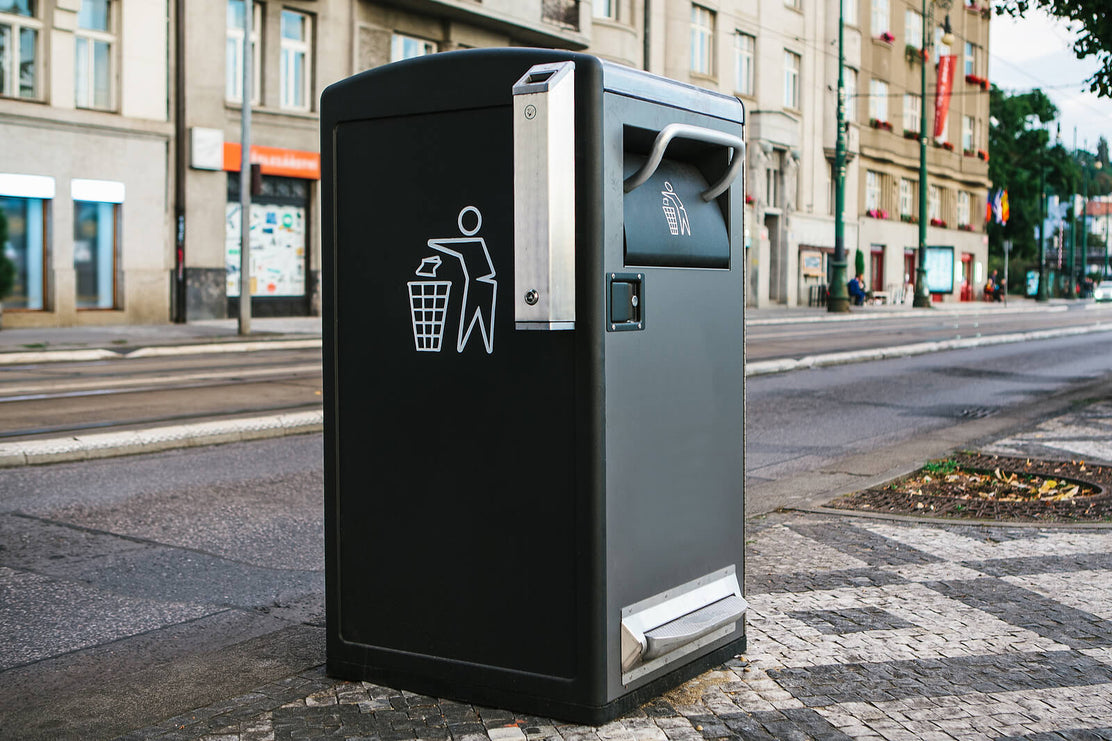The UK population has grown year-on-year since 1982. This means more consumption, resulting in greater levels of rubbish and recycling to manage and collect. Overcrowded bins, high-traffic areas with no waste containers, and poor recycling practices contribute to inefficient waste management.
Investing heavily in technology is the next step in overcoming some of the waste management industry’s biggest challenges. Cue the smart bin, which uses data to manage waste in big cities and public places effectively. While still rare on our shores, they can encourage sustainable waste management and help improve waste collection, transportation, and recycling efficiency.
Let’s lift the lid on smart bins and learn more about them.
What is a smart bin?
Smart bins are waste containers with an intelligent system that provides detailed insights into the amount of waste inside the bin and the types it receives. They help busy locations like shopping centres, airports, schools, and hospitals track the occupancy ratio of their bins, maximise space for public rubbish, and optimise their waste collection services.
How does a smart bin work?
Fill-level sensors integrated inside a smart bin recognise when an item is deposited. Image recognition (via a camera sensor) and robotic technology are then used to identify and segregate different waste streams. Any contaminated items are assigned to the landfill bin, while recyclables (glass, metal cans, plastic, paper, etc.) are delivered to their corresponding bin through robot automation.
The sensors are IoT-enabled (Internet of Things) and report how full the bin is in real-time. This data is sent to a cloud-based monitoring and analytics platform to help waste management services streamline their schedule to save fuel and time.
Many smart bins also have an environmentally friendly compactor that allows them to house eight times more waste and avoid overflowing. The compactor runs off solar power and compresses the waste, meaning fewer bins are needed to collect the same amount of rubbish. Once the compactor has compressed the waste, another internal capacity measurement is taken (the sensor also measures capacity when placing rubbish into the container).
If that isn’t enough, intelligent safety sensors are also installed to stop compaction if it detects a hand, preventing accidental injuries. Smart bins can also identify fires, alert the monitoring station, and even extinguish flames to lighten the load on local fire brigades.
Are smart wheelie bins available in the UK?
Smart rubbish bins were first used in the UK in 2011, with many local authorities rolling them out on a trial basis to clean up their communities. Several villages in the Derbyshire Dales, including Flagg and Hathersage, are among those that received the new hi-tech bins.
Even though smart bins are far from finished, they were trialled on Sutton High Street in 2019 with impressive results. Twenty-one standard litter bins were replaced with 10 ‘compactor smart bins’, leading to a 90% reduction in collections and over 43,000 litres of waste collected in the first four weeks.
While councils continue to work hard to tackle litter in their towns and reduce their carbon footprint using smart bins, this comes at an eye-watering price.
How much does a smart bin cost?
In 2019, Manchester City Council spent £250,000 on 51 solar-powered smart bins to tackle rubbish in the city centre. Working out at just under £5,000 a bin, they are far more expensive to manufacture, install, and maintain than traditional rubbish bins. Their cost is often a pivotal factor for organisations with limited budgets.
What are the main features of smart bins?
Some of the key features of smart bins include:
- A fill-level sensor – Detects how full the smart waste bin is and sends the data to a cloud-based analytics platform to alert those responsible for it.
- A solar-powered compactor – Works as a source of energy to compress the bin’s contents, enabling it to hold up to eight times more waste and reduce collection frequency.
- Intelligent waste segregation – Image recognition and robots efficiently sort and segregate recyclables.
- Built-in display panel – An integrated screen for displaying personalised content, eye-catching promotions, and educational content around waste and recycling.
- Closed design – Prevents pests from entering and slowing down waste decomposition.
Advantages of a smart bin
Smart bins can be a real asset to busy city centres and other high-traffic areas by offering the following benefits:
- A compaction system to maximise the capacity of the container.
- No overflowing bins, significantly improving public hygiene (no unpleasant smells, attracting pests, etc.).
- Optimised routes for waste collection services. Waste is only collected when the bin is full, which means less emissions, fuel use, workforce, and traffic congestion.
- An intuitive dashboard helps operators track diversion rates, spot trends, and make strategic decisions.
Disadvantages of smart bins
While smart bins offer some effective ways to improve the collection and disposal of waste, many challenges are still rife. The disadvantages of smart bin waste management include:
- Dependence on technology — Any components that fail (e.g., the connectivity or sensors) can disrupt the waste management process. Data security concerns can also arise if it’s not managed correctly.
- The cost of smart bins is still off-putting for many businesses and organisations. This relates to the upfront cost of implementation and subsequent maintenance costs.
- Smart bins could reduce the need for manual waste management, increasing unemployment for unskilled workers.
- Lack of versatility — Smart containers are only practical for locations with high footfall and substantial waste production. For example, this offering from CitySolar has an enormous 1200 litre capacity and an average compaction ratio of 6:1. Despite being ideal for collecting large volumes of waste, it’s not built to withstand demanding industrial environments.
Are smart rubbish bins the future of waste management?
Smart bins can lead the shift towards a more sustainable future and improve operational efficiency, but they are currently only suited to serve busy areas with high pedestrian traffic. Creating meaningful change in the waste industry takes time.
Traditional bins will remain essential for waste collection and recycling efficiency, especially for domestic households and many commercial entities.







Craig Pryce
With over 17 years of experience in the waste and recycling industry, Craig is passionate about making recycling easier and reducing the negative impact of litter. He has been the managing director of Wheelie Bin Solutions (WBS) since January 2016, and prides the company on his expert knowledge, top-quality products, and customer service. His proudest moment was when WBS supported the 2012 Olympic Games, working in partnership with Contenur UK to supply over 9000 bin containers to all Olympic venues. Craig is always keen to share his knowledge, so whether you need advice about the benefits of a wheelie bin lock, or ideas for alternative uses for your wheelie bin, Craig will ensure your recycling and waste disposal habits are gold medal worthy.